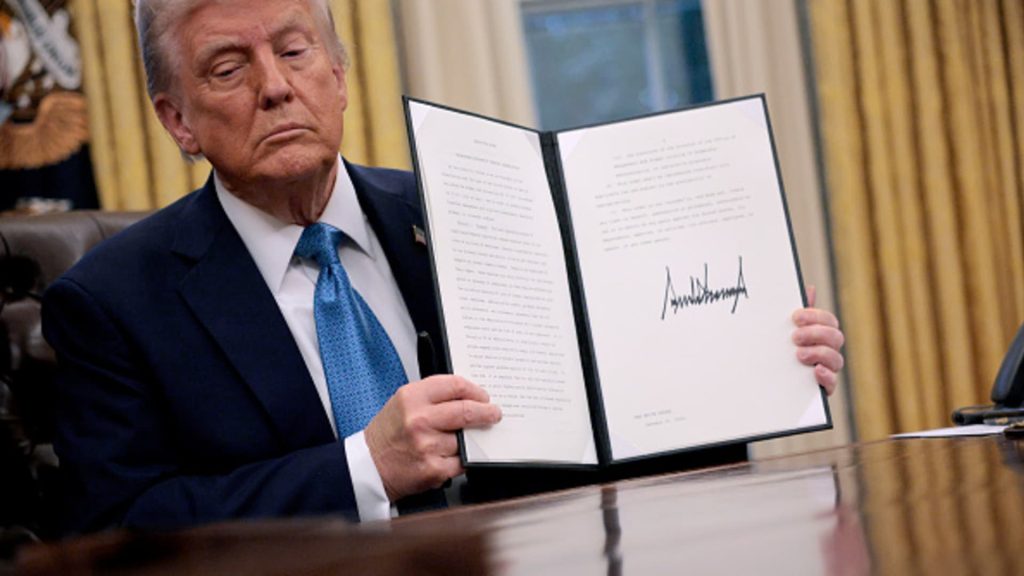U.S. President Donald Trump hold up an executive order, “Unleashing prosperity through deregulation,” that he signed in the Oval Office on January 31, 2025 in Washington, D.C., while also speaking to reporters about tariffs against China, Canada and Mexico.
Chip Somodevilla | Getty Images News | Getty Images
The U.S. stock market was rocked Monday after President Donald Trump kicked off a possible global trade war. Shares of companies spanning the auto, industrial, retail and beverage industries with international supply chains were hit particularly hard.
Trump on Saturday slapped a 25% tariff on goods from Mexico and Canada, while adding a 10% levy on imports from China. The president said Monday that he’s pausing the Mexico tariffs for one month after Mexican President Claudia Sheinbaum agreed to immediately send 10,000 soldiers to her country’s border to prevent drug trafficking. Trump also ramped up his tariff threats to the European Union.
Tariffs could not only increase the cost of transporting goods across borders, they could also disrupt supply chains and crimp business confidence. Goldman Sachs warned that Trump’s latest action could cause a 5% sell-off in U.S. stocks due to the hit to corporate earnings. Here are some of the most affected industries and stocks:
Automakers
These tariffs could have a material impact on the global automotive industry, which has a heavy reliance on manufacturing operations across North America.
Detroit’s big three car makers — General Motors, Ford, and Stellantis — could feel the pain from disrupted supply chains as a result of tariffs and may be forced to shift production from foreign factories to the United States.
Automakers getting crushed
Food and beverage
Constellation Brands, a large importer of alcohol from Mexico, is leading a sell-off among booze stocks.
Canada has threatened to pull American alcohol from its government-run liquor shelves in response to Trump’s 25% tariffs.
Restaurant chain Chipotle Mexican Grill and avocado company Calavo Growers could feel the pain from more costly supplies, as these companies import avocados from Mexico.
Retailers
Sportswear brands Nike and Lululemon could be vulnerable to Trump’s tariffs because of their heavy reliance on Chinese imports, including fabrics. Their sizable business in China could also be hurt by the negative sentiment from the trade war.
Discount retailers such as Five Below could be among the hardest hit businesses, as imports from China usually make up a significant portion of their sales. Dollar General shares initially sold off on tariff news but finished Monday in the green. Dollar General put its direct import percentage at 4% in 2023. Another victim could be Canada Goose, a Canada-based luxury outerwear firm.
Railroads
Tariffs could be damaging to railroad operators, as heavy duties could slow the flow of goods being transported to the U.S., hurting their revenue and profits.
Union Pacific
Union Pacific Corporation moves freight to and from the Atlantic Coast, the Pacific Coast, the Southeast, the Southwest, Canada and Mexico. Norfolk Southern and Canadian Pacific Kansas City are also exposed to the tariffs.
Chinese e-commerce
Trump’s tariffs also targeted a trade provision that helped fuel the explosive growth of budget online retailers, including Temu. The orders against China, Canada and Mexico all halt a trade exemption, known as “de minimis,” which allows exporters to ship packages worth less than $800 into the U.S. duty-free.
PDD Holdings-owned Temu and Alibaba’s AliExpress may no longer be able to take advantage of the loophole to sell cheap apparel, household items and electronics.

PDD Holdings
Clarification: This story has been updated to clarify that Dollar General put its direct import percentage at 4% in 2023.
